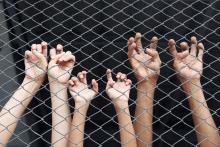Commentary

IN SEPTEMBER, President Obama signed a new 10-year agreement with Israel’s Prime Minister Benjamin Netanyahu committing a total of $38 billion in military assistance.
President Obama noted that this—the most significant support package ever offered to Israel—demonstrated his unparalleled commitment to that state’s security. Shortly thereafter, Obama, speaking before the U.N., cautioned Israel that it “cannot permanently occupy and settle Palestinian land.” The two messages combined made the point that the U.S. can help to protect Israel from external foes, but if Israel wants to be protected from internal challenges, it must change its behavior vis-a-vis the Palestinians.
Just a few weeks later, Netanyahu announced that he was building new settlement units in colonies deep in the West Bank and maintaining ongoing plans to expand settlements in other sensitive areas of the occupied lands—in Arab areas of Jerusalem, in the heart of Hebron, and around Bethlehem.
These are clear provocations and together point to Israel’s intention to maintain its control over the West Bank, making impossible the establishment of a viable Palestinian state.
The Obama administration reacted harshly to the Israeli move. A White House spokesperson noted that every U.S. administration since 1967 has opposed settlements in the occupied lands, the expansion of which will only further frustrate a two-state solution to the Israeli-Palestinian conflict.
The White House also accused Netanyahu of violating his commitment to the U.S. that he would refrain from any further settlement expansion. The State Department “strongly condemned” the Israeli plan, referring to the expansion as yet “another step toward cementing a one-state reality of perpetual occupation.”

I AM A FAMILY PHYSICIAN in Cleveland. For more than two decades, I have cared for lower-income families whose health struggles were made worse by their inability to afford private health insurance or to qualify for publicly funded health insurance through Medicaid or Medicare. Very few of their employers offer health insurance. This results in unaffordable medications and treatments, poor control of chronic illnesses, and avoidable complications from these illnesses.
The Affordable Care Act (ACA) of 2010 represented a sea change in the lives of my patients. They benefitted from two major health-insurance expansions: individual health-insurance exchanges, with subsidies to help middle-income families buy private insurance, and an expansion of Medicaid.

ARE CLEVERLY branded fishing hats, stuffed animals, and fancy dinners to blame for the raging opioid and heroin epidemic in the U.S.?
Most of us know the breathtaking scope of that epidemic. People are dying of overdoses at a higher rate than ever in our history—nearly 80 deaths every single day. Four of every five heroin users trace their addiction back to prescription painkillers or opioids.
Less well known is the unethical corporate sales and lobbying blitz that helped trigger the epidemic. During the two decades when addiction rates climbed to unprecedented numbers, multiple pharmaceutical companies spent billions of dollars pushing physicians and patients into a downward spiral of painkiller overprescription and abuse.
Corporate painkiller promotions included dinners and junkets for physicians and direct outreach to patients. One company even funded a “pain guide” that cheerfully promoted the life-changing benefits of opioids while citing multiple “disadvantages” of over-the-counter medications such as ibuprofen. At the same time, the industry was using insider ties to rewrite the medical guidelines that justified the rash of prescriptions.
The efforts paid off. In 2010 alone, physicians wrote 254 million prescriptions for opioids, and pharmaceutical corporations raked in $11 billion in opioid sales.
Multiple companies are culpable, but the most high-profile effort was Purdue Pharma’s promotion of OxyContin. Purdue’s marketing centered on the claim, embossed on its complementary fishing hats and plush toys, that each dose of the drug provided 12 hours of relief. The lengthy duration was the factor that distinguished OxyContin from other, cheaper alternatives.
Unfortunately, for many patients, the drug’s effects did not actually last that long, according to multiple clinical trials, patient experiences, and physician reports. When OxyContin’s effects wore off before the next scheduled dose, it created desperate patients—and what one neuropharmacologist calls “the perfect recipe for addiction.” In one New York county, for example, between 1996 and 2011 opioid pill use increased 1,136 percent and heroin use rose 425 percent.

FRESH-WATER CRISES have become regular headline news—think of the water shutoffs in Detroit, the systemic contamination combined with structural racism in Flint, the ongoing angst over algal blooms in Lake Erie, and drought in many parts of the country.
When President Trump extolled the importance of investing in infrastructure, water scholars such as myself wondered: What might this mean for the water supply, treatment plants, and distribution systems that strive to keep our country quenched and flushed?

AUTHORITARIANISM is on the march. The rise of right-wing populism in Hungary, Poland, the Philippines, and now the United States highlights the fragility of democracy. Hungary’s Prime Minister Viktor Orban has propagated anti-immigrant sentiment while cracking down on independent media. Poland’s nationalist party has challenged judicial independence while asserting state control over media. Philippine’s President Rodrigo Duterte has vowed to strip civil liberties and employ violent vigilantism to address drug problems. In the U.S., Donald Trump mobilized a largely white base while railing against societal groups, including Muslims and immigrants, to win the election.
Authoritarian figures elected in democratic contexts often ignore constitutions, gut institutions, consolidate power, and snuff out domestic dissent. Dictators are often vindictive; they put themselves above the law and thrive on fear and popular apathy. Their toolkit includes ridiculing and delegitimizing protesters, pitting societal groups against each other, and coopting potential challengers.
But authoritarian figures have an Achilles’ heel. To stay in power, they depend on the obedience and cooperation of ordinary people. If and when large numbers of people from key sectors of society (workers, bureaucrats, students, business leaders, police) stop giving their skills and resources to the ruler, he or she can no longer rule.
Historically, the most powerful antidote to authoritarian figures has been strategic organizing and collective action. That includes civil resistance, employing tactics such as marches, consumer boycotts, labor strikes, go-slow tactics, and demonstrations. In democracies, civil resistance has often been used alongside institutional approaches (elections, legislation, court cases) to defend and advance political and economic rights.

BETWEEN 1980 and 2013, the federal prison population increased by 800 percent, according to the Department of Justice, at a far-faster rate than the Bureau of Prisons could handle. By 2013, approximately 15 percent of BOP’s prisoners were housed in for-profit prisons.
In August, the Department of Justice (DOJ) announced that it will no longer contract with private prisons for housing federal prisoners. “[Private prisons] simply do not provide the same level of correctional service, programs, and resources,” said Deputy Attorney General Sally Yates. “They do not save substantially on costs; and as noted in a recent report by the Department’s Office of Inspector General, they do not maintain the same level of safety and security.”
Within weeks, Secretary of Homeland Security Jeh Johnson responded to DOJ by directing his teams “to evaluate whether the immigration detention operations conducted by Immigration and Customs Enforcement [ICE] should move in the same direction” — to evaluate whether ICE should eliminate contracts with for-profit immigration detention companies. There is no need for a review. Multiple reports, from human rights organizations and the Department of Justice itself, give damning evidence against the inhumane practices of for-profit prisons and detention centers.
As the leader of a Christian denomination, I feel a deep obligation to pay attention to foundational passages from our sacred texts in the midst of the current challenges we face as a country. When it comes to prisoners and immigrants, two passages are bedrock for me. Leviticus 19:34 reminds us to love foreigners as we love ourselves. In Matthew 25:31-46, Jesus prioritizes the vulnerable. He issues a clear call for those who follow him to care for the stranger, the prisoner, the naked, the hungry, and the thirsty.

ON JUNE 15, 2016, Mohammed el-Halabi, manager of World Vision’s Gaza programs, was arrested by Israeli authorities, accused of funneling millions of donor dollars to Hamas, the Islamist political party that rules inside Gaza.
The case made international headlines—and had a dangerous chilling effect on Christian aid organizations working in the Middle East.
Well before el-Halabi had the opportunity to be tried—let alone convicted—of any crime, the Israeli foreign ministry prepared talking points, background materials, infographics, and videos, ordering the country’s diplomats to hype el-Halabi’s alleged confession to media and senior government officials around the world.
“Contacts, journalists, and relevant opinion makers should be briefed,” ordered senior foreign ministry officials, with particular focus on targeting “liberal and religious groups,” reported an Israeli newspaper.
But cracks in the Israeli government’s case appeared almost immediately. The most gaping: “World Vision’s cumulative operating budget in Gaza for the past 10 years was approximately $22.5 million, which makes the alleged amount of up to $50 million being diverted hard to reconcile,” said Kevin Jenkins, president and CEO of World Vision International.
According to World Vision, its programs in Gaza are subject to internal and independent audits and external evaluations to ensure that funds benefit those intended, precisely the nearly half of Gaza’s population living in poverty under a crippling blockade enforced by Israel. El-Halabi was accused of embezzling $50 million, yet World Vision’s accountability process caps signing authority at $15,000.
Undeterred by the facts, an Israeli foreign ministry spokesperson told Australian media: “It’s like when you catch a serial killer; the question of whether he killed 50 people or 25 people is not really relevant, is it?”

TWO WHITE TEENAGERS were recently convicted of spraying racist graffiti on a historic black school in northern Virginia. Their somewhat unusual sentence: Read from a list of 35 books, one a month for a year, and submit a report on all 12 to their parole officers. The booklist included Cry the Beloved Country, by Alan Paton,To Kill a Mockingbird, by Harper Lee, I Know Why the Caged Bird Sings, by Maya Angelou, Night, by Elie Wiesel, and other classics.
The remarkable feature of this sentence was how it clashed conceptually with the customary default question that suffuses our judicial system: How long a prison sentence does the crime deserve?
A strange mathematics is at work in our criminal justice system: For every crime, a matching time in prison. Translating the crime of racist graffiti into reading books that might reform the minds of two teenagers makes a certain rational match with the crime. Putting them in prison for five years is no match at all.

FIVE HUNDRED YEARS after Martin Luther’s charge semper reformanda (“always reforming”), we stand on the precipice of climate disaster.
In Marrakesh, Morocco, people of faith met at the 2016 U.N. Climate Change conference (COP22) to face an impending climate disaster—a disaster that now seems likely to be exacerbated by U.S. political leadership rather than mitigated by it.
The World Council of Churches held an event in Marrakesh to emphasize how transitional justice- and rights-based approaches, alongside faith-based moral perspectives, can address challenges as complex as natural-resource management and ecological, humanitarian, and spiritual crises exacerbated by climate change. WCC organizer Henrik Grape hoped that “COP22 will take steps forward to fulfill the expectations from Paris and that nations will raise their ambitions to keep the temperature [rise] well under 2 degrees Celsius.”
A wide variety of church bodies were represented at the gathering. The Lutheran World Federation brought youth delegates from Africa to Marrakesh to promote intergenerational collaboration and solidarity with people most affected by climate change. “One of our thematic approaches to the commemoration of 500 years of Lutheran Reformation is the theme ‘Creation: Not For Sale,’” said Caroline Bader, youth secretary for the federation. The Act Alliance, a coalition of 143 churches and parachurch organizations, established a gender-climate change working group to address sustainability among poor and marginalized people through a gender lens.
Catholic theologian Guillermo Kerber believes that Pope Francis’ encyclical on the environment is a turning point for the social doctrine of the Catholic Church, by including ecology in the social concerns of Catholics. “The celebration of the 500 years of the Reformation should be an opportunity to express an ecological conversion of all Christian denominations,” said Kerber.

LAST DECEMBER, my daughter, Zipporah—who has taken to acting out the Christmas story using our wooden nativity set—observed that our crèche was missing a “mean king” figurine. That got me to thinking: I have never seen a nativity set with a King Herod figure.
We tend to close the curtains and go home for a family dinner right after the Magi bow before Jesus with their gifts of gold, frankincense, and myrrh.
But after the Magi head home, Joseph is warned in a dream to escape Herod’s genocidal tyranny by fleeing to Egypt with his wife and child.

DONALD TRUMP HAS released many bizarre and disturbing tweets in recent months, none more alarming than his statements in December that the “U.S. must greatly strengthen and expand its nuclear capability” and “Let it be an arms race. We will outmatch them at every pass and outlast them all.”
Commentators were dumfounded by the messages, which seemed to come out of nowhere, and dismissed them as bluster not to be taken seriously. The tweets were deeply troubling, however, and indicate that the new president is ignorant of nuclear realities and intent on ratcheting up nuclear spending and challenging others to keep up.
Thankfully, the potential competitors in such a contest seem uninterested. Russian President Vladimir Putin announced during his annual press conference the day after Trump’s messages that Russia will reduce military spending next year as it adjusts to economic recession at home. China has indicated no change in its longstanding policy of maintaining a small but capable nuclear force. Trump may be ready for an arms race, but as of now his rivals seem to have no interest in running.
Nuclear bravado can change these calculations, however, especially if it is accompanied by substantial increases in spending for new weapons. Trump has promised to give more money to the military and bolster nuclear capability. U.S. weapons makers Boeing and Lockheed are competing for multibillion-dollar contracts to replace and upgrade the U.S. land-based missile force. Former Defense Secretary William Perry has argued that the plan to rebuild nuclear missiles is wasteful, unnecessary, and dangerous.

RELIGION IS AN EASY language for people to use to define conflict. The people most willing to speak about what religion demands are the ones least likely to be invested in the sacrifices religion requires. They want the power that they believe they can claim through religion.
Those same voices who engage in this idle worship now hold the reins of power in the U.S. government. And they seek to exterminate Muslims. There are concerns of a Muslim registry and internment camps. More extreme fears consider other types of camps, imagining a return of the Holocaust. These fears are not unfounded, nor are they out of character with what President Trump’s advisers and appointees have said.
Yet these parallels are so powerful that I think it may be difficult for them to be realized. What I think is more likely in the near term is a different historical parallel. At the waning of another empire, the Colosseum became a space where individuals were martyred for what they believed, for entertainment.
An individual loss may be horrible, but the individual’s community may still believe it is safe. But death can come by a thousand cuts. The lion that chooses one life at a time remains a ravenous beast—the whole community will be vilified and will eventually die, just not quickly. And that beast will need a new food source.
The mayor of New York announced a 35-percent increase in hate crimes in the city in the month following the election. During that time there were 43 hate crimes documented. In December, a Muslim Metropolitan Transportation Authority worker wearing her uniform and a hijab was pushed down a flight of stairs at Grand Central station, and a Muslim police officer was threatened, in front of her teenage son, with having her throat slit. In August, two Muslim leaders were shot to death after leaving prayers at their mosque. For years, the New York police department has spied on Muslims where we pray.

IN DECEMBER 2014, the United Nations approved a resolution put forth by Bangladesh and more than 100 other countries that included a reference to “unarmed civilian protection.” This was the first time the phrase had been referenced in an official U.N. General Assembly document.
The following year, a U.N. report noted that “unarmed civilian protection is a method for direct protection of civilians and violence reduction that has grown in practice and recognition. In the last few years, it has especially proven its effectiveness to protect women and girls.”
Last fall, Tiffany Easthom, executive director of Nonviolent Peaceforce, addressed a special U.N. session on unarmed civilian protection with a bold proposal: “The [U.N.] Security Council could ensure the centrality of unarmed strategies in protection of civilian mandates.”
Unarmed civilian protection, or UCP, is just what it sounds like: nonviolent action by civilians to protect other civilians from political violence. The peacekeeping practice is rooted in the call for a “peace army”—a Shanti Sena—by Mohandas Gandhi and Khan Abdul Ghaffar Khan, whom the pope referenced in his 2017 World Day of Peace message.
Peace Brigades International is generally credited with initiating the current practice in the 1980s in Guatemala. Peace Brigades International focused on specific strategies based on the principles and practices of nonviolence, the primacy of local actors, independence, and for many but not all organizations, nonpartisanship, in an organized, disciplined way.
Many organizations around the world are currently practicing this method of intervention, including Peace Brigades International, Nonviolent Peaceforce, Christian Peacemaker Teams, SweFOR, Meta Peace Team, Operation Dove, Ecumenical Accompaniment Programme in Palestine and Israel, the Presbyterian Peace Fellowship, and others.

WEST VIRGINIA’S schoolteachers went on strike on Feb. 22. Although West Virginia has a proud labor history, the state’s two teacher unions (West Virginia Education Association and American Federation of Teachers-West Virginia) do not have the right to strike. After decades of labor movements failing nationally, the Trump age has not seemed like a prime moment for a revival. And West Virginia’s government is firmly in the hands of Republicans.
Fast-forward to March 7. Schools reopened after a statewide strike that lasted two weeks. Teachers procured a 5 percent raise, not only for themselves but for all state employees, from state police to highway maintenance workers to clerks at the DMV.
When schools reopened, the Charleston Gazette-Mail interviewed a woman dropping off her grandchildren at Horace Mann Middle School. She said the children wanted to support their teachers, who every day stood in the cold outside their school. “Every time we’d pass by the teachers [picketing] outside, they’d say, ‘Blow it, Nana. Blow the horn.’”

IT IS INTERESTING, yet not surprising, what the political status of Puerto Rico in the wake of Hurricane María reveals about colonialism, the coloniality of power and gender, emergency government response, and civilian resilience.
Hurricane María was the worst natural disaster Puerto Rico has ever faced and the 10th-most-intense Atlantic storm on record. But Puerto Rico has experienced more than 500 years of colonial activity between the Spanish and North American empires. In addition, because much of Puerto Rico’s religion came to the island through colonization and violence, many Puerto Ricans today still struggle to trust religion and may not see religious organizations as options for help in times of adversity.
My experience in post-María Puerto Rico has made me aware of the still-present legacy of the struggle against white supremacy, racism, heteronormativity, and sexism on the island. As an Afro-Puerto Rican feminist and Christian, I am aware of the ideological and religious struggles inherent in negotiating the nature of our citizenship with the oppressive political dynamics that are exacerbated by a massive natural disaster.
Hurricane María—and its sustained winds of 160 miles per hour—blew the neoliberal veil from the colonizers’ face. The limited response from the federal government in Washington, D.C., along with our unstructured colonial system, increased already-high poverty levels from 44 to 52 percent, according to the University of Puerto Rico, and swelled the numbers of people who left the island looking for better living conditions and a brighter future. After the hurricane, Puerto Rico’s status as an unincorporated U.S. territory blocked aid from several other countries, because the 1920 Jones Act only allows entrance to the island by U.S. ships.
Despite all this, the Puerto Rican people have demonstrated their resilience and capacity to overcome adversity. Citizen mutual aid, in partnership with nonprofit organizations and local churches, proved to be one of the most crucial and immediate forms of assistance after the hurricane.

I AM A CHRISTIAN. That means that I serve a savior who told us he came to free prisoners. At the same time, I live in a nation with more than 2 million prisoners, more than any country in the world.
I am also an affluent white person living in a country that unequally and selectively jails people of color and poor people. And I don’t just live in this country, I help govern it.
As a state representative in Michigan, I am responsible for this situation. The government directly chooses who goes to jail and who doesn’t. Of course, since our democracy practices government “of the people,” that makes all of us responsible for government actions.
How should Christians who are also citizens take action for justice in our law enforcement system? Responding to mass incarceration as Christians can seem daunting, but there are obvious places to begin. One of the clearest places our current system fails the test of equal treatment under the law is in the detention or release of those accused of, but not convicted of, a crime.

THE LONG-OVERDUE transition of power in South Africa this winter, from President Jacob Zuma to Cyril Ramaphosa, has sparked a resurgence of hope among younger church activists in the country. Zuma’s nine years in office were catastrophic to South Africa’s politics and social fabric through entrenched corruption and state capture. Zuma and his cronies enriched themselves while the economy stumbled, with unemployment now above 27 percent and schools and health care in an increasing state of crisis.
While Ramaphosa’s election by the National Assembly has inspired hope, an awakening less heralded and potentially more significant long term has been taking place across the church in South Africa. The theology of hope and liberation that helped fuel the anti-apartheid struggle played a formative role in shaping the public theology of many in the U.S. and around the world. Now a new generation of South African Christian activists is on the cutting edge of social transformation.
In the aftermath of Zuma’s resignation, a handful of these leaders addressed the catalytic role the church has played in shifting the political winds in South Africa and their hope for the future.

PURPLE IS THE liturgical color for Lent. “Purple” is also the political identity of America’s houses of worship. We are a mixture of Republicans, Democrats, and independents who come together for worship, fellowship, and service. No political party owns religious truth.
In 2017, some in Washington, D.C., made a concerted effort to undermine churches’ congregational political mix through the repeal of the Johnson Amendment, a provision in the tax code since 1954 that protects the independence and integrity of not-for-profit organizations by prohibiting them from endorsing or opposing candidates for public office.
The Johnson Amendment does not specifically target churches; it applies equally to all 501(c)(3) organizations, religious and secular. Under the current tax code, churches are assumed to be 501(c)(3) organizations (c3s) but can opt for another tax-exempt status. Most churches remain c3s because in addition to being tax exempt, congregants’ tithes and offerings are tax deductible. Despite some hysterical claims, churches and charitable organizations can address any issue—no matter how controversial or unpopular—under the current tax code. The line is drawn, however, at c3 organizations telling people who to vote for or against.
During the fall debate on the largest change to the U.S. tax code in 30 years, the House version of the tax bill would have effectively repealed the Johnson Amendment. The Senate version never included such language, nor did the final version of the bill that became law.
We might have seen the end of this longstanding tax provision if not for the outcry from nonprofits, foundations, and people of faith. Can you imagine? Candidate commercials played during worship services. Candidate flyers included in every bag of food given out by the local food pantry.

RECENT STATEMENTS by tech luminaries suggest that robots with artificial intelligence (AI) are on the cusp of conquering the world. These fears are slightly overblown—researchers assure us that we are nowhere near “conscious” AI. More important, these apocalyptic predictions distract us from the problems that Christian ethics finds in existing forms of automation.
These problems arise from the replacement of central aspects of human existence for the sake of efficiency and convenience. Most obviously, automation leads to the replacement of workers, decimating not only manufacturing jobs but also white-collar jobs as AI becomes more sophisticated. Self-driving cars alone threaten 4 million jobs. While economists predict new employment opportunities, tech executives are less confident, leading to calls for a universal basic income.
Automation is also replacing inconvenient forms of relationship. In Alone Together, Sherry Turkle documents substitutes for relational labor that involve nurturing or therapy, such as robot caregivers for the elderly. Many people embrace these automated caregivers, projecting emotions upon them and sometimes preferring them to humans.
The turn from relationships is increasingly widespread in society. Internet algorithms provide us with a world that reflects ourselves back to us—movies, news, and friends already tailored to our interests. It is easy to understand this turn toward technology: Relationships can be difficult. They involve inconvenient emotions, unrestricted demands, and challenging points of view.
Automation even challenges that most troubling of relations, our own embodiment. Emerging from René Descartes’ philosophy that saw the body as mere mechanism and unnecessary for our identity, artificial intelligence suggests we can live a disembodied existence, such as some transhumanists’ longing to upload themselves to a computer. While transhumanism is a fringe movement, devices encourage more and more people to live with their attention drawn away from the embodied present.

THIS TAX DAY, some middle-class Americans may be tempted to celebrate. Under the new law approved in December, the bottom 60 percent of earners (those making less than $86,100 a year) are expected to receive 2018 tax cuts worth $407 on average.
But if you think you’ll be among those who owe Uncle Sam less under the new law, don’t get your party hat out yet. These tax cuts come at a high price.
For example, a typical preschool teacher (single, with no children) who makes $30,000 per year can expect a tax cut of $457. That’s enough to pay for a new refrigerator or several months of electricity bills. But other changes to the tax code could put this teacher’s job in jeopardy. State governments have been expanding pre-K programs in recent decades, but many of them are expected to have their education budgets squeezed because of the new tax law’s caps on state and local tax deductions.
In the meantime, the preschool teacher could have more hungry children in her classroom. The new tax law reduces incentives for charitable contributions, including for food banks and other services that early-childhood programs rely on. Donations to nonprofits are expected to drop by as much as $20 billion this year, according to the Tax Policy Center.
What about middle-class families who are making significantly more than the typical preschool teacher? Let’s look at a couple who run a plumbing business in Louisiana, with $135,000 in joint income. The Tax Policy Center estimates they’ll get a tax cut of $609 in 2018. But that same couple can expect to be slammed with a spike in their health insurance premiums of $1,900—triple their tax cut! That’s because the new tax law repealed a key part of the Affordable Care Act that requires individuals to have health coverage if they can afford it. This could lead to an estimated 13 million more people becoming uninsured and huge increases in premiums for those who remain in the individual market.
These are just some of the immediate effects of a tax law that overwhelmingly favors the wealthy and big corporations. In the longer term, the costs to working families will be much more painful.